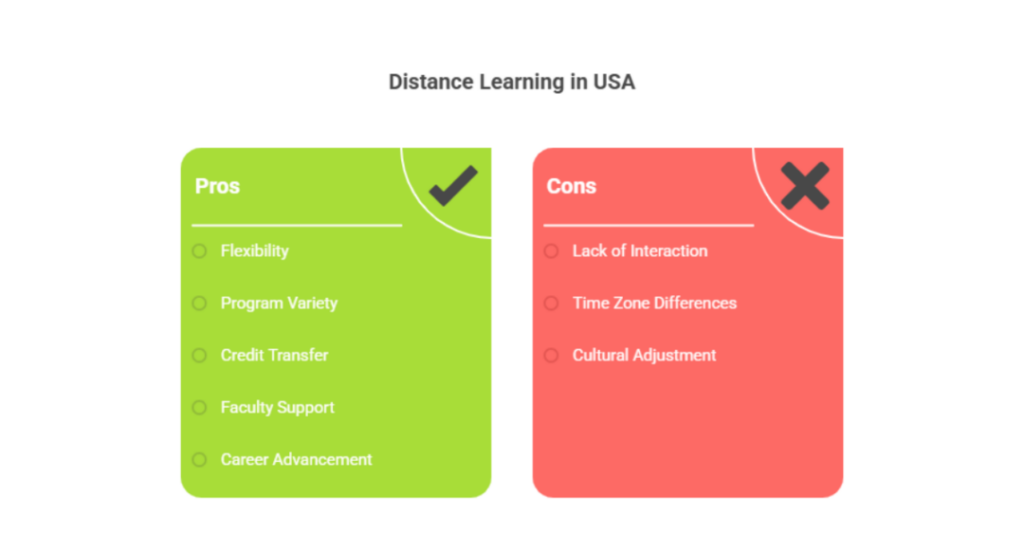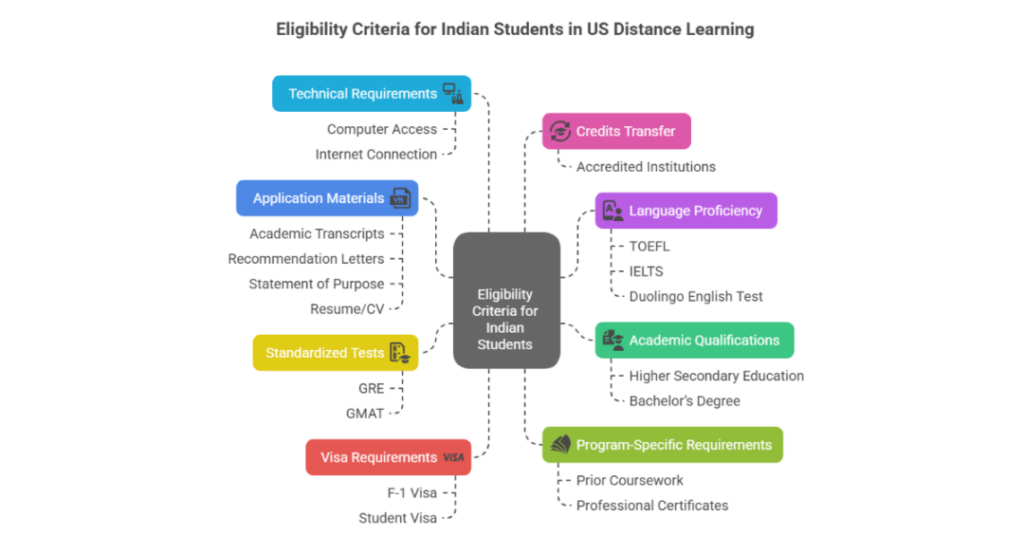23 May 2025
5 minutes read
10 Top Distance Learning Universities in USA for Indian Students

Key Takeaways
- Distance learning universities in USA offer Indian students flexible, accredited online degree programs that match the quality of on-campus education.
- Scholarships and financial aid options are widely available, helping Indian students manage tuition costs while pursuing undergraduate and graduate studies.
- Meeting eligibility criteria, including language proficiency and credit transfer policies, is essential for a smooth admission process and successful online learning experience.
Did you know that over 6 million students in the U.S. enrolled in online education in 2025, with a growing number being international learners? Yet, many Indian students face challenges like high costs, rigid schedules, and limited access to quality programs when seeking distance learning universities in USA.
Thankfully, flexible online degrees from top universities in the United States now offer regionally accredited programs that let Indian students earn the same degree as on-campus peers, anywhere in the world, at their own pace.
Why Indian Students Are Choosing Distance Learning Universities in USA?
Indian students are increasingly choosing distance learning universities in USA due to the flexibility and variety of online programs offered. From online bachelor’s and master’s degrees to professional certificates and free online courses, top universities like Arizona State University, University of Florida, and NYU provide fully online coursework that matches on-campus degrees.

These programs allow students to learn at their own pace, transfer credits, and access faculty support without relocating. With regionally accredited options and competitive per credit costs, distance education opens opportunities for Indian students to advance their careers while balancing personal commitments, making it an attractive choice for undergraduates and graduate students alike.
10 Top Distance Learning Universities in USA for Indian Students
Distance learning universities in USA have seen a surge, with over 7 million online students enrolling in undergraduate and graduate degree programs in 2025.
For Indian students seeking flexible, accredited online learning options, these universities offer the best online courses and certificate programs that match on-campus degree quality, supported by renowned faculty and cutting-edge resources.
| University | Popular Course(s) | Average Tuition Fees (USD) | Exams Required |
|---|---|---|---|
| Arizona State University | Online Bachelor’s, Data Analytics | $530 per credit | TOEFL/IELTS, SAT/ACT |
| University of Florida | Online Graduate Degrees, Business | $552 per credit | TOEFL/IELTS, GRE (for grad) |
| University of California (various) | Online Master’s, Computer Science | $600 per credit | TOEFL/IELTS, GRE |
| New York University (NYU) | Online Certificate, Data Science | $700 per credit | TOEFL/IELTS, GRE (if grad) |
| Georgia Institute of Technology | Online Master’s, Data Analytics | $850 per credit | TOEFL/IELTS, GRE |
| University of Illinois Urbana-Champaign | Online MBA, Engineering | $550 per credit | TOEFL/IELTS, GRE |
| Penn State World Campus | Online Bachelor’s, Cybersecurity | $555 per credit | TOEFL/IELTS, SAT/ACT |
| Oregon State University | Online Graduate Degrees, Analytics | $526 per credit | TOEFL/IELTS, GRE |
| University of Massachusetts Amherst | Online Master’s degree, Education | $800 per credit | TOEFL/IELTS, GRE (if grad) |
| Drexel University | Online Bachelor’s degree, Nursing | $615 per credit | TOEFL/IELTS, SAT/ACT |
Eligibility Criteria for Indian Students at Distance Learning Universities in USA
When applying to distance learning universities in USA, Indian students must meet specific eligibility criteria to ensure a smooth admission process.

These universities offer flexible online courses at both undergraduate and graduate levels, with programs designed for international students who seek high-quality education. Below are the general eligibility requirements for Indian students:
Academic Qualifications:
For online undergraduate programs, students must have completed their higher secondary education (12th grade) from a recognized board. Graduate programs typically require a relevant bachelor’s degree.
Language Proficiency:
International students, including those from India, must submit proof of English proficiency through exams like TOEFL or IELTS. Some programs may also accept the Duolingo English Test.
Standardized Tests
Many graduate programs, especially in fields like business or engineering, require GRE or GMAT scores. However, some universities offering online graduate programs might waive this requirement based on academic performance or professional experience.
Application Materials
Students need to submit their academic transcripts, letters of recommendation, a statement of purpose (SOP), and a resume/CV for graduate programs. Some programs also ask for work experience.
Visa Requirements
Although distance learning doesn’t require students to relocate, those attending certain in-person requirements or hybrid courses may need an F-1 visa or a student visa.
Program-Specific Requirements
Some online colleges may have additional prerequisites, such as prior coursework in specific subjects or professional certificates. For example, online data analytics programs may require a background in mathematics or statistics.
Credits Transfer
Students interested in transferring credits from previous coursework should check if the distance learning university accepts transfer credits from accredited institutions.
Technical Requirements
All students must meet the minimum technical requirements, such as having access to a computer with an internet connection capable of supporting online learning platforms.
Meeting these eligibility criteria is crucial for Indian students interested in pursuing online degrees from top research universities or state universities in the USA. The opportunity to learn at your own pace through synchronous or self-paced online courses ensures flexibility for those balancing work, study, or other commitments.
Scholarships and Financial Aid for Indian Students in USA Distance Learning Programs
Scholarships for international students and financial aid can significantly ease the cost burden for Indian students pursuing distance learning universities in USA. Many top online colleges and state universities offer dedicated funding options for international students, including those enrolled in individual courses, massive open online courses (MOOCs), and full degree programs.
These resources help students who want to advance their professional skills or pursue a career through flexible and affordable education. Understanding the available scholarships and aid options ensures Indian students can access quality education on par with on-campus graduation standards.
| Scholarship/Fund Name | Eligibility Criteria | Coverage | Applicable Programs | Notes |
|---|---|---|---|---|
| University of Florida Distance Learning Scholarship | International students enrolled in undergraduate or graduate online programs | Partial tuition waiver | Online undergraduate and graduate degrees | Based on academic merit and financial need |
| Arizona State University Online Aid | Indian students in top online bachelor’s and master’s programs | Varies by program | Distance learning courses, certificate programs | Renewable annually, includes MOOC-based credits |
| Georgia Institute of Technology Online Scholarships | Students pursuing online graduate degrees in STEM fields | Partial tuition grant | Online graduate programs in data analytics, engineering | Requires maintaining a minimum GPA |
| Penn State World Campus Grants | International online students demonstrating financial need | Up to 50% tuition support | Undergraduate and graduate online programs | Applies to both synchronous and self-paced courses |
| Drexel University Online Awards | Indian students in specific programs with strong academic records | Varies | Online bachelor’s and certificate courses | Offers additional resources to help with fees |
| University of Massachusetts Online Scholarships | International students enrolled full-time in online graduate degrees | Partial tuition waiver | Online master’s and certificate programs | Prioritizes students in education and health fields |
| MOOCs with Financial Aid | Students enrolled in massive open online courses through platforms like Coursera or edX | Covers course fees | Individual courses and certificate programs | Ideal for professional skill development |
These scholarships follow best practices and are often listed on university websites or US News rankings. Indian students interested in learning through distance education can leverage these opportunities to reduce costs while benefiting from high graduation rates and strong faculty credentials.
Conclusion
Distance learning universities in USA offer Indian students the chance to earn a degree as on-campus students with the flexibility to learn anywhere. With access to top online bachelor’s programs, MOOCs, and new degree options backed by strong faculty credentials and support services, students can pursue undergraduate degrees in related industries without relocating out-of-state.
If you’re looking for a flexible, high-quality online offer that fits your goals, Ambitio is here to guide you. Ready to build a standout profile and unlock global opportunities? Connect with Ambitio Elite, your partner in turning study abroad dreams into reality!
FAQs
Can I transfer credits from an online program to a traditional university?
Yes, credits from accredited online programs are often transferable to traditional universities. However, it’s essential to check with the specific institutions involved.
Are there financial aid options available for online students?
Yes, many online programs offer financial aid options, including scholarships, grants, and student loans, similar to traditional programs.
How do online universities ensure student engagement and interaction?
Online universities use various tools like discussion forums, group projects, and live webinars to foster engagement and interaction among students.
What are the main benefits of studying at distance learning universities in USA?
Key benefits include flexibility, access to quality education from anywhere, and the ability to balance studies with work or other commitments
Can international students enroll in distance learning universities in USA?
Yes, international students can enroll in many distance learning universities in USA and study from their home country
How are courses delivered at distance learning universities in USA?
Courses are usually delivered through online platforms using video lectures, interactive assignments, and digital resources, allowing flexibility for students
What types of programs do distance learning universities in USA offer?
Distance learning universities in USA provide a wide range of programs, including associate, bachelor’s, master’s, and even doctoral degrees in fields like business, IT, health, and more.

You can study at top universities worldwide!
Get expert tips and tricks to get into top universities with a free expert session.
Book Your Free 30-Minute Session Now! Book a call now




























